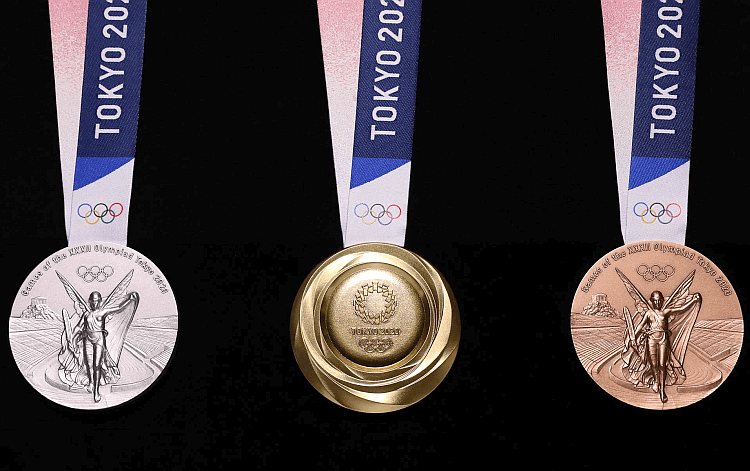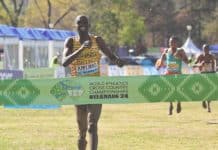News, views and noise from the non-stop, worldwide circus of Olympic sport:
● Games of the XXX Olympiad: London 2012 ● The International Olympic Committee sent out another of its now-familiar notices that included the details:
“Artur Taymazov, 40, of Uzbekistan, competing in the men’s freestyle 120kg wrestling event (qualifications and finals), in which he ranked 1st and was awarded the gold medal, has been disqualified from the Olympic Games London 2012. Re-analysis of Taymazov’s samples from London 2012 resulted in a positive test for the prohibited substance Dehydrochlormethyltestosterone (oral turinabol).”
This is an especially problematic case, as Taymazov was a three-time gold medalist in the 120 kg Freestyle class, winning in Athens in 2004, then in Beijing in 2008 and at London, But he was disqualified for doping in the IOC’s re-testing of the 2008 samples, and now in 2012 as a result of the latest re-test.
He still has the 2004 gold and a silver medal from Sydney in 2000.
The 2012 results were already marred by a doping positive for the silver medalist, Davit Modzmanashvili of Georgia. That means Iran’s Komeil Ghasemi and Russian Bilyal Makhov could end up as co-gold medalists, since wrestling awards two bronze medals. And the new co-bronze medalists for London would be American Tervel Dlagnev and Daulet Shabanbay (KAZ).
The IOC also updated its statistical report, showing that 60 doping positives have been identified from the London Games in 2012, to go along with the nine found during the Games. The Beijing Games in 2008 had the most ever: seven announced during the Games and 65 more found after the Games (72 total).
Although Taymazov wrestling for Uzbekistan, he is now a Russian politician, elected to the Duma in 2016.
● Games of the XXXII Olympiad: Tokyo 2020 ● The Tokyo organizers unveiled the medal designs for next year’s Olympic Games, based on an open, nationwide submission contest won by Junichi Kawanishi, Director of the Japan Sign Design Association and the Osaka Design Society.

The medals themselves are being made with metals donated by Japanese citizens through the recycling of mobile telephones. According to the announcement, more than 1,300 schools and 2,100 electronics retailers were involved in the recycling program. It was impressive:
“With more than 90 per cent of Japan’s local authorities participating, a total of 78,985 tons of discarded devices were collected, a haul which included approximately 6.21 million used mobile phones, along with digital cameras, handheld games and laptops, all of which were then classified, dismantled and melted down by highly trained contractors.
“This meant that the final goals of 30.3kg [66.8 lbs.] of gold, 4,100kg [9,039 lbs.] of silver and 2,700kg [5,952 lbs.] of bronze were reached by the time the collection cycle closed on 31 March 2019.”
About 5,000 medals will be produced.
● Gymnastics ● It was a week ago, but worth commemorating the 43rd anniversary of the first score of “10.00″ in the Olympic Games, achieved by then-14-year-old Nadia Comaneci of Romania at the Montreal Games in 1976.
She received the mark for her routine in the Team compulsory phase on 18 July 1976 and the scoreboard only had room to show three digits – a 10.00 was considered impossible – so the display read “1.00.”
That opened the floodgates. Comaneci went on to score seven 10s, with four on the Uneven Bars and the other three on Beam. Russia’s Nelli Kim also received a 10.00 on the Vault.
Comaneci won five medals in Montreal, with golds in the All-Around, Uneven Bars and Beam; silver in the Team competition, and a bronze on Floor. She won two more golds in 1980 (Beam, Floor) and two silvers (Team, All-Around).
Comaneci retired in 1984 and was not allowed to participate in the Los Angeles Games. She left the country in 1989, just before the fall of the Communist government in Romania, eventually landing in the U.S. She eventually married American gymnast Bart Conner in 1996.
But she will always be remembered as the first “perfect 10″ in Olympic history.
● Swimming ● A Katie Ledecky update, after her excellent performance in the 4×200 m Freestyle, taking the U.S. into the lead on the second leg and posting the third-fastest split in the race.
After the relay, she told USA Swimming:
“I don’t know what caused this all, but I was feeling the effects of dehydration, loss of appetite, light headedness – just a bunch of different things. It kind of created the perfect storm to pull me out. It’s one of those things where you have to put your health first, and I just put my trust in our great medical staff, and they did a tremendous job of doing everything they could to help me.
“I didn’t get back into the water until last night, and we kept it really easy. We checked my heart rate nearly every 50, and doctors and the coaches felt that I was good to go if I felt that way. I slept on it and woke up and felt I was ready to race.”
In the women’s 800 m heats, Ledecky was in the final race and swam easily, charging only on the final lap, but came up slightly short of teammate Leah Smith, who beat her for the first time ever in 8:17.23-8:17.42, with Australia’s Ariane Titmus third in 8:19.43. Those three had the fastest times in the qualifying; we’ll know a lot more about how recovered Ledecky is when the final comes on Saturday.
Also in the Friday morning heats, American Regan Smith, now 17, won her heat in 2:06.01, a World Junior Record, a lifetime best and moving to no. 9 in history and no. 3 in U.S. all-time, behind only world-record holder Missy Franklin (2:04.06 ‘12) and Maya DiRado, who swam 2:05.99 to win at Rio in 2016!
● At the BuZZer ● Until the shared Japan-Korea World Cup in 2002, the idea that an event like the FIFA World Cup could be held in more than one country was rarely considered. After the 2022 event in Qatar, however, it might become the norm.
The 2026 program will be a combined Canada-Mexico-U.S. production, although most of the games will be in the U.S. For 2030, however, the concept is in overdrive with multi-country bids being discussed from:
● Africa: Algeria, Morocco and Tunisia
● Europe: Great Britain and Ireland
● South America: Argentina, Chile, Paraguay and Uruguay (and maybe Bolivia)
Of course, there is also expected to be a bid from China, the world’s largest country by population and which has never hosted a World Cup previously. The selection will likely be made in 2024.




















